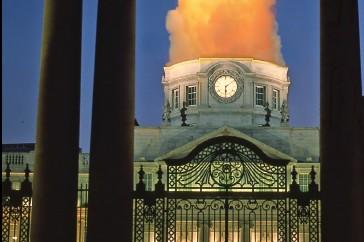Energy efficiency in public buildings could save €100m

Instituting energy efficiency measures in public sector buildings could save the taxpayer up to €100m in two to three years, according a report by Dublin Friends of the Earth (DFOE).
The ‘Through the Roof’ report shows that only one in five public buildings in Ireland have Display Energy Certificates (DECs). Public buildings with a floor area greater than 1,000m2 are legally required to have a DEC since 1 January 2009. This equates to approximately 5,000 public buildings in Ireland.
Of the 793 public buildings with DECs, none achieves the top rating of A1, while 83 achieve the worst possible rating of G. Almost half the public buildings that are certified are rated at D1 or lower. DFOE estimates that €100m can be saved within three years and says that it makes sense for government to start reducing public expenditure by addressing energy inefficiency now. Sustainable Energy Ireland (SEI) says that progress is being made in this regard; however, speedier progress is being held up by a seemingly simple issue. "We have been told by some managers in state bodies that the slow part of the process was...finding accurate plans or measurements," said Anne Heussaff of DFOE. "The whole thing could happen quickly once [the public service] had done the groundwork."
Only 8 per cent of DECs were in place by June of this year despite SEI’s claim that most should be in place by that date. The current government policy stipulates that public sector energy use must be cut by 33 per cent by 2020. For Heussaff, however, SEI may be hindered by the funding available. "We suspect that... [they] are under resourced for all the schemes they've been given charge of."
According to the report, Ireland left it to “the last possible moment to implement the Energy Performance in Buildings Directive” as agreed by the EU in December 2002; implementation began on the deadline date of 1 January 2009. With the Green Party currently in government it seems surprising that an effort has not been made to roll the measures out more quickly. For Heussaff it is clear that "the political will and the resources that follow haven't been sufficient to get the job done."
Despite this, however, most of the public agencies expressed a desire for the directive to be implemented. Energy efficiency campaigns are being rolled out by the Office of Public Works, Dublin City Council, An Post and across the education system. While DFOE lauds these efforts they neverthless hope to see “such patchy progress...replaced with across the board planned reductions, based on national targets and actions in all sectors”.
Implementation of energy efficient retrofitting of public buildings could also come as welcome news for Ireland's struggling construction industry. Similar schemes such as SEI's Home Energy Saving Scheme created work for builders, plumbers and engineers throughout the country. While the scale of the work required is not yet clear, the work involved should provide a welcome boost to the industry.
DFOE has called for 100 per cent certification by March of next year and for a co-ordinated system of targets to be implemented for improving energy ratings across the board. However, SEI told DFOE that it “cannot speculate on when 90-100% compliance will be achieved”. Savings need to be made urgently if the impact of public expenditure cuts is to be lessened and for DFOE these potential savings represent a relatively straightforward, environmentally friendly way of easing the severe burden on public expenditure.
